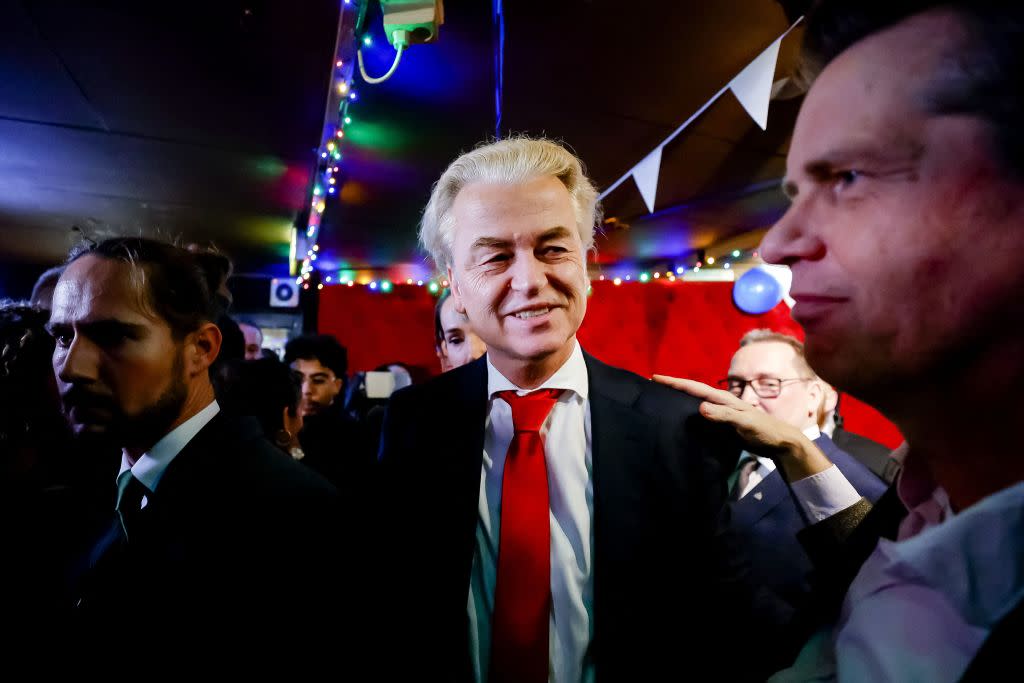What a Hard-Right Victory in the Netherlands Means for Europe

- Oops!Something went wrong.Please try again later.
PVV leader Geert Wilders reacts to the results of the House of Representatives elections in Scheveningen, the Netherlands, on Nov. 22, 2023. Credit - Remko de Waal—AFP/Getty
For decades, the hard-right firebrand Geert Wilders has been shunned from mainstream Dutch politics. So when the results from the Netherlands’ snap election showed his Party for Freedom (PVV) emerging as the largest party, even he could hardly contain his shock. “35!” Wilders exclaimed in apparent disbelief, his arms outstretched, as the exit polls flashed the party’s projected seat count on the screen. (That forecast has since risen to 37 seats, putting the PVV well ahead of its main center-left and center-right rivals, which won 25 and 23 seats, respectively.)
While Wilders’ first-place performance puts him in a strong position as the parties enter into coalition talks, the prospect of him entering the Dutch government, let alone leading it as prime minister, is not a foregone conclusion. That will ultimately depend on whether any of the other 15 parties elected to Parliament are willing to enter into coalition with Wilders, which some parties, including the second-place Labor-Green alliance, have ruled out.
But regardless of whether the far-right leader wins power, or in what capacity, the outcome of the Dutch elections is particularly bad news for the European Union, which alongside Islam and immigration remains one of Wilders’ ideological bogeymen. In addition to campaigning for a Brexit style “Nexit” referendum, Wilders also advocates ending the free movement of labor within the E.U. and, perhaps most concerning of all for the bloc, cutting military aid to Ukraine. Nationalist leaders as far afield as Austria, Belgium, Italy, France, Germany, and Spain all rejoiced at the prospect of another nationalist, anti-establishment voice joining their ranks.
Analysts who spoke with TIME say that the prospect of the Netherlands ending its military aid to Ukraine outright remains unlikely, with or without Wilders in power. Indeed, the Dutch government recently allocated an additional 2 billion euros in military aid, bringing the Hague’s total support for Ukraine to roughly 7.5 billion euros. “I presume that probably won’t happen, depending on how the coalition works out,” Ben Coates, the author of Why the Dutch are Different, tells TIME in a phone call. “But I think that’s a dangerous moment for the E.U. and for Ukraine when that starts to become an election-winning issue.”
While observers credit Wilders’ campaigning on salient issues such as immigration and the cost of living as part of the reason he was able to command such unexpected support, the scale of his victory can also be attributed at least, in part, to the approach of his center-right rivals, who not only helped amplify his signature issue (outgoing Prime Minister Mark Rutte’s successor Dilan Yesilgöz, herself a former refugee, pledged to cut immigration if elected) but even opened the door to working alongside Wilders in coalition. In doing so, the center-right had perhaps hoped to outflank Wilders among right-wing voters. By treating Wilders as a viable coalition partner, however, they appear to have achieved just the opposite.
Should Wilders enter the Dutch government, “there will be a much tougher line on spending and the treaties that are agreed in the E.U. on immigration and asylum policy,” says Coates, noting that Brussels would almost certainly find itself with a much more difficult partner in the Netherlands than it’s had in the last 13 years under Rutte. But even if Wilders is excluded from government and the country ends up with a more left-leaning coalition, such as one led by former European Commissioner Frans Timmermans, Coates says he will still be able to “steer the debate and frame it in such a way that [makes] it tricky for Dutch politics to come out strongly pro-Europe at this point.”
What sway Wilders will ultimately have on the Netherlands—and, by extension, Europe—will ultimately be determined by the outcome of the coalition talks, which are expected to be a months-long affair. Sarah de Lange, a politics professor at the University of Amsterdam, tells TIME in a phone call that although the exclusion of the largest party from government is not without precedent, the scale of Wilders’ victory would make such a gambit extremely difficult. “It will mean that this coalition will very likely include four, if not five, parties,” she says, which would make the government vulnerable to division. It also risks creating a legitimacy crisis that Wilders could exploit. “Even though these parties might exclude him from government, that might mean that his voters become even more dissatisfied with democracy and its workings because they’re the largest party and they’re being excluded,” says de Lange, “which matches the populist narrative of the idea that there is a political elite that’s trying to keep him from power.”
If Brussels is worried about the hard-right’s rise in the Netherlands and what it portends for next year’s European elections, it isn’t showing it. “We continue to count on the Netherlands’ strong participation in the European Union,” European Commission spokesperson Eric Mamer told reporters on Thursday. But as the bloc’s Euroskeptic wing sees it, Wilders’ victory has reinvigorated Europe’s populist right at a time when many believed it was losing support.
“The winds of change are here!” Hungarian Prime Minister Viktor Orban said in a celebratory post. In response, one social media user said: “Let's hope that the wind will blow all over Europe.”
Write to Yasmeen Serhan at yasmeen.serhan@time.com.
